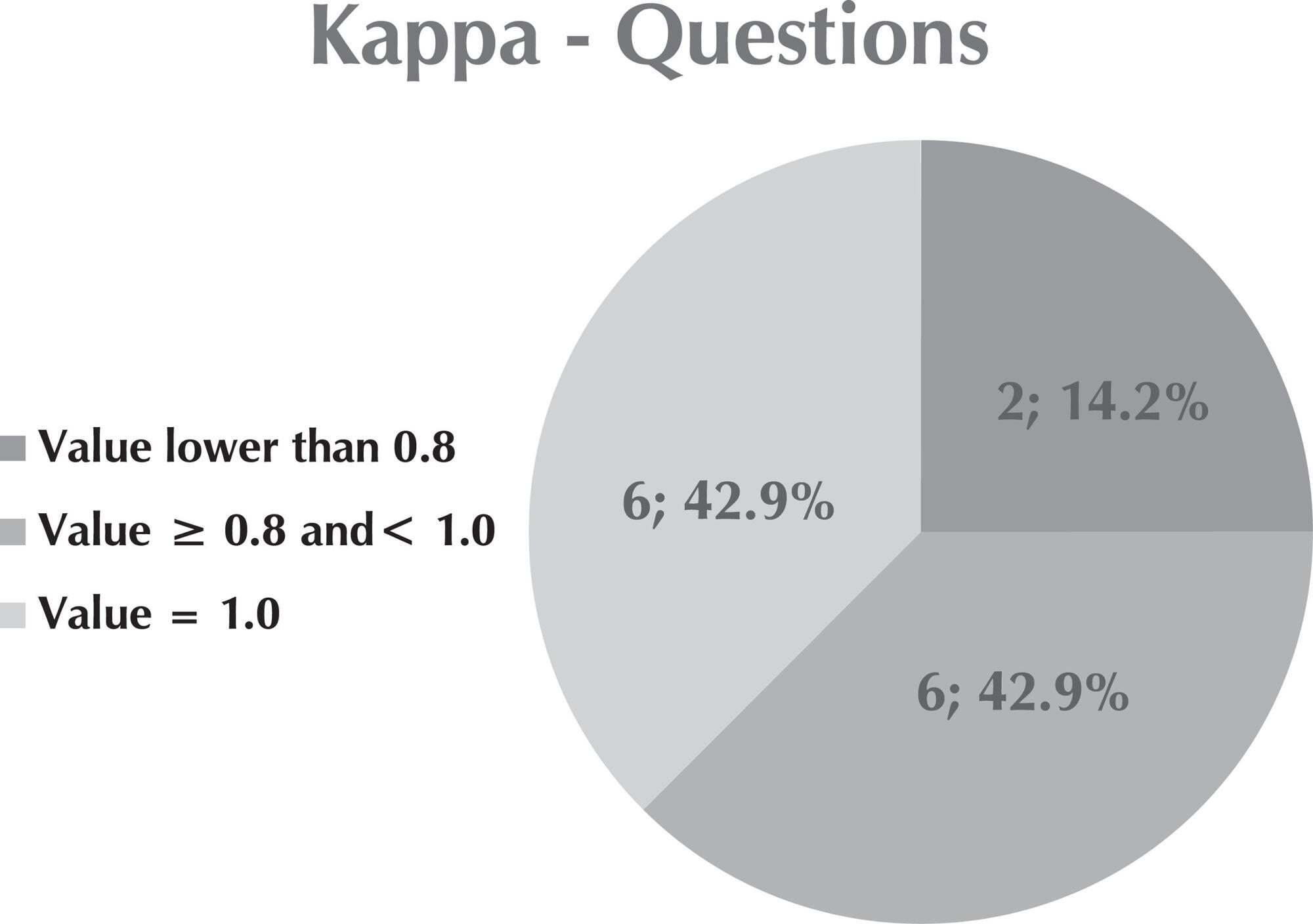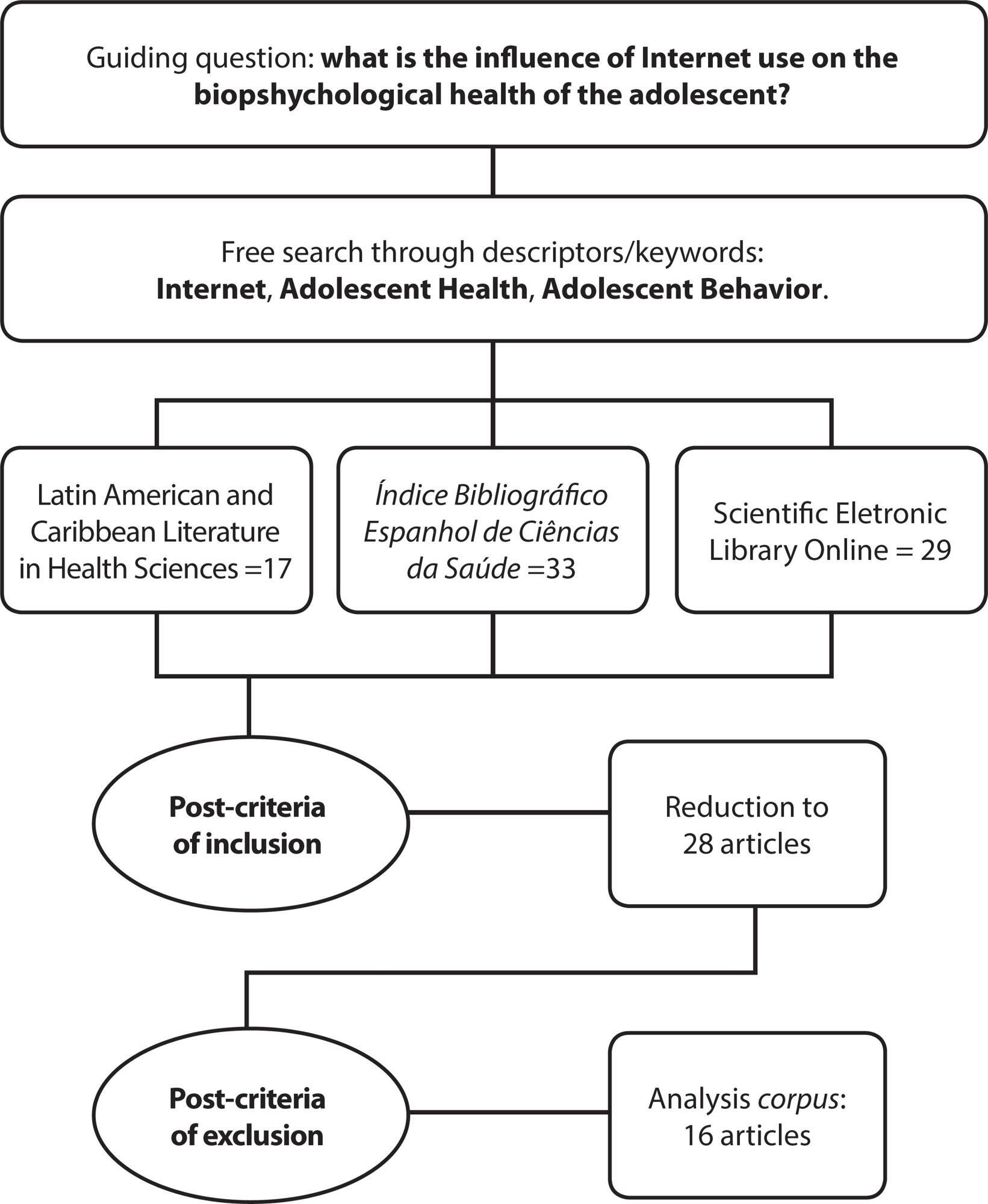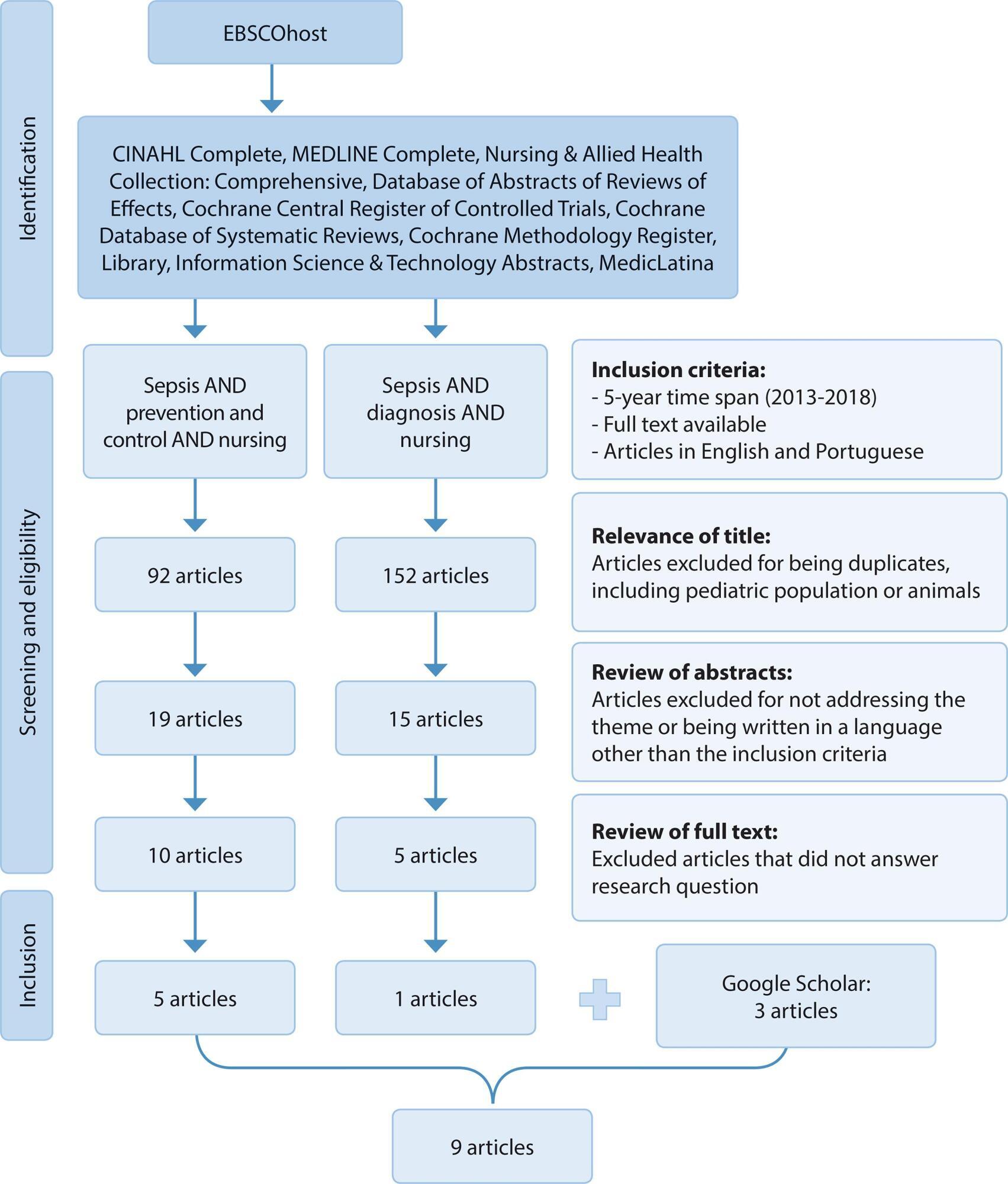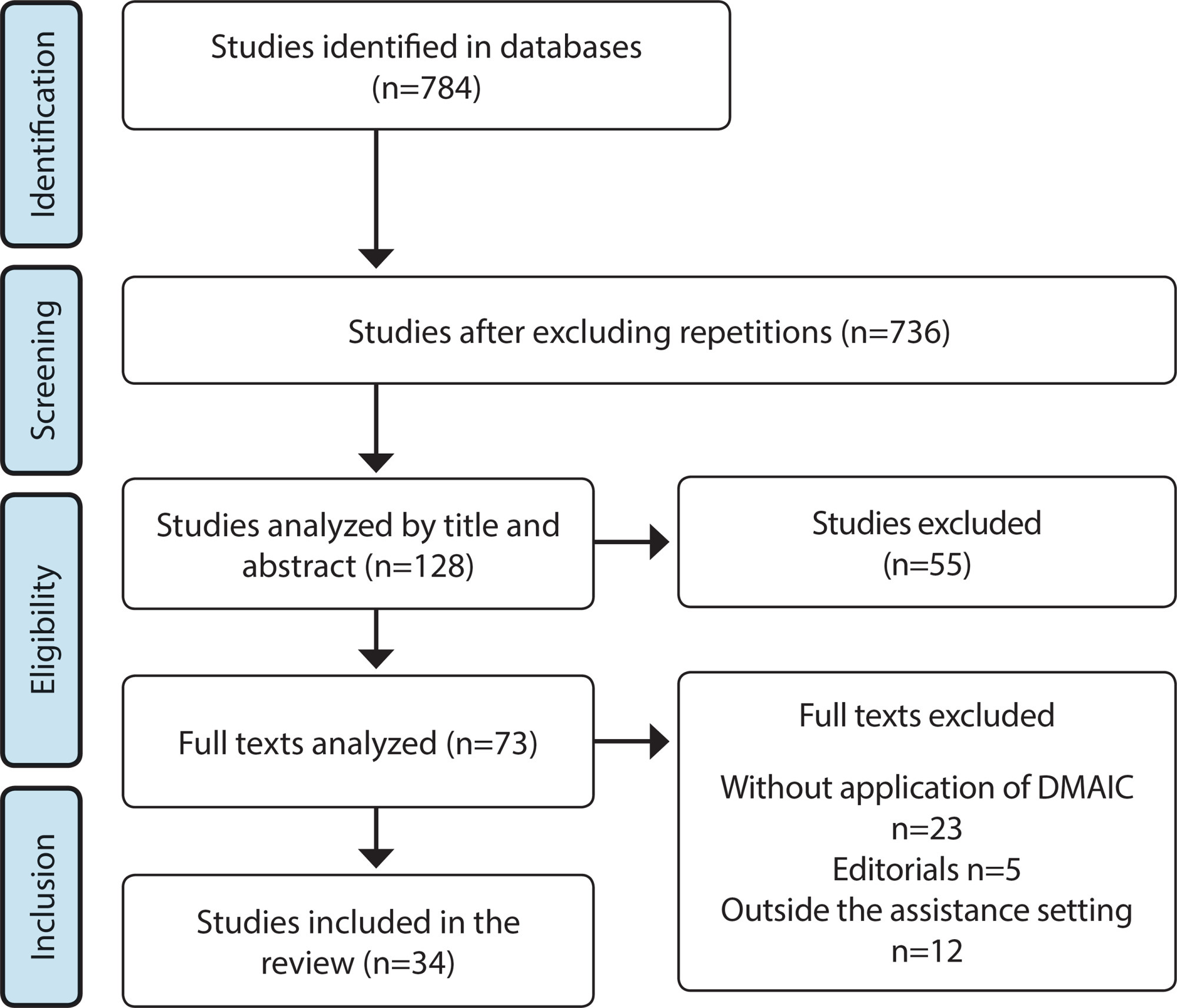-
RESEARCH01-01-2017
Virtual learning object and environment: a concept analysis
Revista Brasileira de Enfermagem. 2017;70(3):572-579
Abstract
RESEARCHVirtual learning object and environment: a concept analysis
Revista Brasileira de Enfermagem. 2017;70(3):572-579
DOI 10.1590/0034-7167-2016-0123
Views0See moreABSTRACT
Objective:
To analyze the concept of virtual learning object and environment according to Rodgers’ evolutionary perspective.
Method:
Descriptive study with a mixed approach, based on the stages proposed by Rodgers in his concept analysis method. Data collection occurred in August 2015 with the search of dissertations and theses in the Bank of Theses of the Coordination for the Improvement of Higher Education Personnel. Quantitative data were analyzed based on simple descriptive statistics and the concepts through lexicographic analysis with support of the IRAMUTEQ software.
Results:
The sample was made up of 161 studies. The concept of “virtual learning environment” was presented in 99 (61.5%) studies, whereas the concept of “virtual learning object” was presented in only 15 (9.3%) studies.
Conclusion:
A virtual learning environment includes several and different types of virtual learning objects in a common pedagogical context.

-
01-01-2017
High prevalence of enteroparasites in children from Ribeirão Preto, São Paulo, Brazil
Revista Brasileira de Enfermagem. 2017;70(3):566-571
Abstract
High prevalence of enteroparasites in children from Ribeirão Preto, São Paulo, Brazil
Revista Brasileira de Enfermagem. 2017;70(3):566-571
DOI 10.1590/0034-7167-2016-0059
Views0See moreABSTRACT
Objective:
To determine the prevalence of intestinal parasites and possible associated factors.
Method:
Cross-sectional epidemiological study of 962 children (3-12-years) from an area within the scope of a basic health unit in Ribeirão Preto, São Paulo, Brazil. Data were collected by home interviews and three-sample stool analysis and evaluated with the chi-square and Fisher’s exact tests (p<0.05).
Results:
The prevalence of intestinal parasites was significantly high (57.5%). Giardia lamblia was the most prevalent (50.8%), followed by Ascaris lumbricoides (17.8%), Entamoeba histolytica, Hymenolepis nana, Entamoeba coli and Enterobius vermiculares (5.6-7.3%) and other parasites of lower prevalence, such as Schistosoma japonicum (1%) and Schistosoma mansoni (0.5%). No statistically significant associations were detected between prevalence and the risk factors analyzed.
Conclusion:
Since the area presents good conditions of environmental sanitation, health education programs should be implemented that emphasize hygiene procedures for the hands and for food and water to be consumed by the population.

-
01-01-2017
Alta prevalencia de enteroparasitosis en niños de Ribeirão Preto, São Paulo, Brasil
Revista Brasileira de Enfermagem. 2017;70(3):566-571
-
RESEARCH01-01-2017
Validation of the adherence questionnaire for Brazilian chronic kidney disease patients under hemodialysis
Revista Brasileira de Enfermagem. 2017;70(3):558-565
Abstract
RESEARCHValidation of the adherence questionnaire for Brazilian chronic kidney disease patients under hemodialysis
Revista Brasileira de Enfermagem. 2017;70(3):558-565
DOI 10.1590/0034-7167-2016-0437
Views0See moreABSTRACT
Objective:
To validate the evaluation questionnaire on adherence of chronic kidney disease (CKD) patients under hemodialysis.
Method:
We verified the following psychometric properties of the instrument: reliability (stability and internal consistency) and validity (face, content, and construct).
Results:
The intraclass correlation coefficient reached a value of 0.98 for the adherence questions and 0.91 for the perception questions. Regarding the kappa of the 14 questions examined, 12 had a value > 0.8, whereas the Cronbach’s alpha had a value of 0.57. Experts ensured the face and content validity of the instrument, giving it an overall content validity index of 0.96. Construct validity, analyzed by Mann-Whitney test, was achieved as all domains showed a significant association with p<0.01.
Conclusion:
We verified, by the presented results, that the instrument has been validated for use in Brazil.

-
RESEARCH01-01-2017
The experience of rural families in the face of cancer
Revista Brasileira de Enfermagem. 2017;70(3):550-557
Abstract
RESEARCHThe experience of rural families in the face of cancer
Revista Brasileira de Enfermagem. 2017;70(3):550-557
DOI 10.1590/0034-7167-2016-0367
Views0See moreABSTRACT
Objective:
To understand the meanings of cancer within the experience of rural families and how such meanings influence family dynamics.
Method:
Qualitative study guided by Symbolic Interactionism as a theoretical framework and Grounded Theory as a methodological framework. Six rural families (18 participants) undergoing the experience of having a relative with cancer participated in the interview.
Results:
Constant comparative analysis of data allowed the elaboration of an explanatory substantive theory, defined by the main category Caregiving to support the family world, which represents the family’s symbolic actions and strategies to reconcile care for the patient and care for family life.
Final considerations:
Throughout the experience, rural families seek to preserve the interconnected symbolic elements that provide support for the family world: family unit, land, work and care.

-
RESEARCH01-01-2017
Contributions of Public Health to nursing practice
Revista Brasileira de Enfermagem. 2017;70(3):543-549
Abstract
RESEARCHContributions of Public Health to nursing practice
Revista Brasileira de Enfermagem. 2017;70(3):543-549
DOI 10.1590/0034-7167-2016-0401
Views0See moreABSTRACT
Objective:
Analyze the perceptions of undergraduate nursing students about the contributions of public health to nursing practice in the Unified Health System.
Method:
Qualitative Descriptive Study. Data collection was carried out through semi-directed interviews with 15 students. The language material was analyzed according to content and thematic analysis.
Results:
Thematic categories were established, namely: “Perceptions about Public Health” and “Contribution of Public Health to nursing practice in the Unified Health System”.
Final considerations:
Perceptions about Public Health are diversified, but converge to the recognition of this field as the basis for training nurses qualified to work in the SUS with technical competence, autonomy and focusing on the integrality in health care.
-
RESEARCH01-01-2017
Cancellation of elective surgeries in a Brazilian public hospital: reasons and estimated reduction
Revista Brasileira de Enfermagem. 2017;70(3):535-542
Abstract
RESEARCHCancellation of elective surgeries in a Brazilian public hospital: reasons and estimated reduction
Revista Brasileira de Enfermagem. 2017;70(3):535-542
DOI 10.1590/0034-7167-2016-0084
Views0See moreABSTRACT
Objective:
To characterize cancellations of elective surgeries according to clinical and non-clinical reasons, as well as to verify seasonal influence and determine the estimated reduction of the index.
Method:
Quantitative, descriptive and retrospective study with secondary data extracted from the Public Hospital of the State of São Paulo database.
Results:
Out of the 8,443 (100%) elective surgeries scheduled, 7,870 (93.21%) were performed and 573 (6.79%) were canceled. Out of these 573 (100%) people, 48.33% were canceled for clinical reasons and 46.40% were for non-clinical reasons. Among the non-clinical reasons for surgery cancellations, those related to medical reasons stood out: at the request of the surgeon/change of approach (17.93%), followed by non-hospitalized patient (8.96%). There was no indication of seasonality regarding the reasons for cancellation in the assessed period.
Conclusion:
Although the rate of elective surgeries cancellations is lower than that of other hospitals with similar characteristics, it is still possible to reduce it from 6.79% to 1.36%, considering that 80% of the reasons for cancellation are avoidable.

-
RESEARCH01-01-2017
Guide of attributes of the nurse’s political competence: a methodological study
Revista Brasileira de Enfermagem. 2017;70(3):526-534
Abstract
RESEARCHGuide of attributes of the nurse’s political competence: a methodological study
Revista Brasileira de Enfermagem. 2017;70(3):526-534
DOI 10.1590/0034-7167-2016-0483
Views0See moreABSTRACT
Objective:
To build and validate a guide of attributes of the nurse’s political competence.
Method:
Methodological research. This study comprised the construction of the instrument through literature review; experts validation of pre-established attributes for composing the guide; and clinical validation in the nurses work environment/reality. The data collection took place in the months from August to October 2014, and the analysis was based on the content analysis of Bardin and use of Epi info 3.5. All ethical precepts have been complied with.
Results:
From 29 attributes found in the literature, 25 have been validated by experts. Clinical/practical validation involved the participation of 43 nurses, who observed that the attributes are not articulated with the professional practices developed by them.
Conclusion:
The attributes of the nurse’s political competence were identified with support of literature. It is concluded that the professionals still have limited and fragmented perception of political competence, expressing difficulty/limitation.
-
ORIGINAL ARTICLE06-16-2021
Patient participation in care safety: Primary Health Care professionals’ perception
Revista Brasileira de Enfermagem. 2021;74(2):e20200773
Abstract
ORIGINAL ARTICLEPatient participation in care safety: Primary Health Care professionals’ perception
Revista Brasileira de Enfermagem. 2021;74(2):e20200773
DOI 10.1590/0034-7167-2020-0773
Views0See moreABSTRACT
Objectives:
to analyze health professionals’ perception about the meaning and practice of patient involvement in care safety in Primary Health Care.
Methods:
this is an exploratory, qualitative study, developed with 22 professionals in the Federal District, Brazil. A semi-structured interview was conducted between October and November/2018. Content analysis was carried out according to Bardin.
Results:
nurses, physicians, dentists, among others, participated. The following categories emerged: Meaning of patient involvement in care safety; Factors intervening in patient involvement in care safety; Strategies for patient involvement in care safety; Qualification for patient involvement in care safety.
Final Considerations:
the meaning of patient involvement for care safety was associated with co-responsibility and patient-centered care. Professionals’ practice revealed intervening factors and the use of involvement strategies. A gap was identified in training on patient involvement in care safety.
-
REVIEW03-30-2020
Internet influence on the biopsychosocial health of adolescents: an integratitive review
Revista Brasileira de Enfermagem. 2020;73(2):e20180766
Abstract
REVIEWInternet influence on the biopsychosocial health of adolescents: an integratitive review
Revista Brasileira de Enfermagem. 2020;73(2):e20180766
DOI 10.1590/0034-7167-2018-0766
Views0See moreABSTRACT
Objectives:
To identify scientific evidence on the influence of internet use on adolescents’ biopsychosocial health.
Methods:
Integrative review, with database search, using the descriptors “internet”, “adolescent health” and “adolescent behavior”. After applying the inclusion and exclusion criteria, 16 articles were selected.
Results:
Knowledge convergence produced for three main themes was demonstrated: “Internet exposure time and possible damages to adolescent health”; “Internet, adolescent and cyberbullying”; and “Internet as a source of information for adolescent health”.
Final considerations:
The network involves an intricate network of interactions, providing varied behaviors and attitudes that reflect on adolescent health. Therefore, it is important to articulate nursing actions with the school community and the family, in order to carry out health education.

-
REFLECTION07-10-2020
Psychosocial risks and the health of health workers: reflections on Brazilian labor reform
Revista Brasileira de Enfermagem. 2020;73:e20190092
Abstract
REFLECTIONPsychosocial risks and the health of health workers: reflections on Brazilian labor reform
Revista Brasileira de Enfermagem. 2020;73:e20190092
DOI 10.1590/0034-7167-2019-0092
Views0See moreABSTRACT
Objective:
to reflect on the psychosocial risks and their impacts on the health of health workers in light of the Brazilian economic context and Labor Reform.
Method:
reflective study on the Brazilian Labor Reform and its impacts on health of health workers.
Results:
although the changes observed in the labor sphere have contributed to improvements in health and safety policies for, these changes have also contributed to the emergence of new risks arising from work activities, including psychosocial risks, which affect all occupational categories.
Final considerations:
we understand that the Brazilian Labor Reform carried out in 2017 leads to the weakening of labor relations, increases workers’ exposure to risks in the workplace, increases the risk of illness, and opposes the global movement of international organizations aimed at the prevention of aggravation in workers’ health and also at preserving their health.
-
REVIEW06-17-2020
The role of the nurse in caring for the critical patient with sepsis
Revista Brasileira de Enfermagem. 2020;73(4):e20190031
Abstract
REVIEWThe role of the nurse in caring for the critical patient with sepsis
Revista Brasileira de Enfermagem. 2020;73(4):e20190031
DOI 10.1590/0034-7167-2019-0031
Views0See moreABSTRACT
Objectives:
to know the nursing interventions in the identification, prevention and control of sepsis in critical patients.
Methods:
integrative review of the literature, with two parallel researches using different MesH terms, using the EBSCO database and Google Scholar. Nine studies were included in the sample.
Results:
nursing interventions are centered on the creation/implementation of protocols for the early recognition of sepsis, the training of teams to ensure a safe and effective approach and the adoption of measures for infection prevention and control as a way to prevent sepsis.
Final Considerations:
the evidence shows that nurses are fundamental in the early identification, control and prevention of sepsis, preventing disease progression and contributing to decreased morbidity and mortality.

-
ORIGINAL ARTICLE05-15-2020
Configuration of power relations in physicians and nurses’ professional practices
Revista Brasileira de Enfermagem. 2020;73:e20180629
Abstract
ORIGINAL ARTICLEConfiguration of power relations in physicians and nurses’ professional practices
Revista Brasileira de Enfermagem. 2020;73:e20180629
DOI 10.1590/0034-7167-2018-0629
Views0See moreABSTRACT
Objective:
to analyze the configuration of power relations constituted in and by the knowledge and daily practices of physicians and nurses in an Intensive Care Unit (ICU).
Method:
qualitative study in which data were collected through interviews with physicians and nurses from an ICU of a hospital in Belo Horizonte, Minas Gerais. A semi-structured script was used. Data were analyzed through discourse analysis in a Foucaultian perspective.
Results:
three categories were developed – Professional Identity: self-recognition in the profession; Discipline: individualizing attitudes or collective need?; and Circularity of knowledge and power in the constitution of daily practices.
Final considerations:
the identity, discipline and circulation of power are connected in a continuous movement of subjectivation of the subject, which, in turn, uses discourse as a persuasion strategy to modify the position taken over in different situations thereby causing the circulation of power.
-
ORIGINAL ARTICLE02-10-2020
Theater of the Oppressed and bullying: nursing performance in school adolescent health
Revista Brasileira de Enfermagem. 2020;73(1):e20170910
Abstract
ORIGINAL ARTICLETheater of the Oppressed and bullying: nursing performance in school adolescent health
Revista Brasileira de Enfermagem. 2020;73(1):e20170910
DOI 10.1590/0034-7167-2017-0910
Views0See moreABSTRACT
Objective:
to assess the effects of an intervention based on the Theater of the Oppressed in reducing school bullying.
Method:
a quasi-experimental study with 232 first-year high school students from two public schools in the city of Cuiabá, Mato Grosso State, Brazil. An intervention was performed with the Theater of the Oppressed, a theatrical methodology created by Augusto Boal and inspired by Paulo Freire’s “Pedagogy of the Oppressed”, in which one school composed the intervention group, and another school, the comparison group. Both groups were assessed for involvement in bullying situations before and after intervention. For data analysis, Poisson Regression models with random effect were used.
Results:
intervention group presented a significant decrease in direct victimization (physical and verbal aggression).
Conclusion:
the Theater of the Oppressed represents an important strategy in reducing bullying victimization among school adolescents.
-
ORIGINAL ARTICLE02-10-2020
Common Mental Disorders and Contemporary Factors: 1982 Birth Cohort
Revista Brasileira de Enfermagem. 2020;73(1):e20180162
Abstract
ORIGINAL ARTICLECommon Mental Disorders and Contemporary Factors: 1982 Birth Cohort
Revista Brasileira de Enfermagem. 2020;73(1):e20180162
DOI 10.1590/0034-7167-2018-0162
Views0See moreABSTRACT
Objective:
To describe the association between common mental disorders and socio-demographic variables, smoking habits and stressful events among the 30-year-old members of a 1982 cohort.
Method:
Mental disorder was analyzed by the Self-Reporting Questionnaire (SRQ-20). Poisson regression was used to analyze the unadjusted and adjusted associations.
Results:
Low level of education and stressful events increased the prevalence of mental disorders for both genders. Lower income for women and unemployment for men also remained associated with CMD.
Conclusion:
It was possible to describe the association between contemporary factors and mental disorders in a young population, to which prevention and control measures, through public policies proposed to the areas of Primary Care, Mental Health and Education, can represent a better quality of life and health.
-
REVIEW12-21-2020
Lean Six Sigma methodology application in health care settings: an integrative review
Revista Brasileira de Enfermagem. 2020;73:e20190861
Abstract
REVIEWLean Six Sigma methodology application in health care settings: an integrative review
Revista Brasileira de Enfermagem. 2020;73:e20190861
DOI 10.1590/0034-7167-2019-0861
Views0See moreABSTRACT
Objective:
to analyze the scientific production on the results of Lean Six Sigma methodology in health care institutions.
Methods:
an integrative literature review, with the following question: what are the results in health institutions using Lean Six Sigma and Six Sigma methodology? The search was carried out at MEDLINE, LILACS, BDENF, CINAHL, Web of Science, and Scopus, with no time frame.
Results:
thirty-four articles were included, published between 2005 and 2019, of which 52.9% came from the United States of America. The most commonly found improvements were in hospital institutions and from the perspective of customers and internal processes.
Conclusion:
using Lean Six Sigma methodology proved to be effective in the different health care settings, evidencing a gap in its application regarding people engagement and training.

Search
Search in:
Nuvem de Tags
Adolescente (85) Atenção Primária à Saúde (239) COVID-19 (91) Criança (91) Cuidados de Enfermagem (269) Educação em Enfermagem (151) Educação em Saúde (139) Enfermagem (930) Enfermagem Pediátrica (86) Estudantes de Enfermagem (77) Estudos de Validação (131) Família (87) Idoso (208) Promoção da Saúde (99) Qualidade de Vida (104) Saúde do Trabalhador (86) Saúde Mental (145) Saúde Pública (82) Segurança do Paciente (150) Tecnologia Educacional (100)



